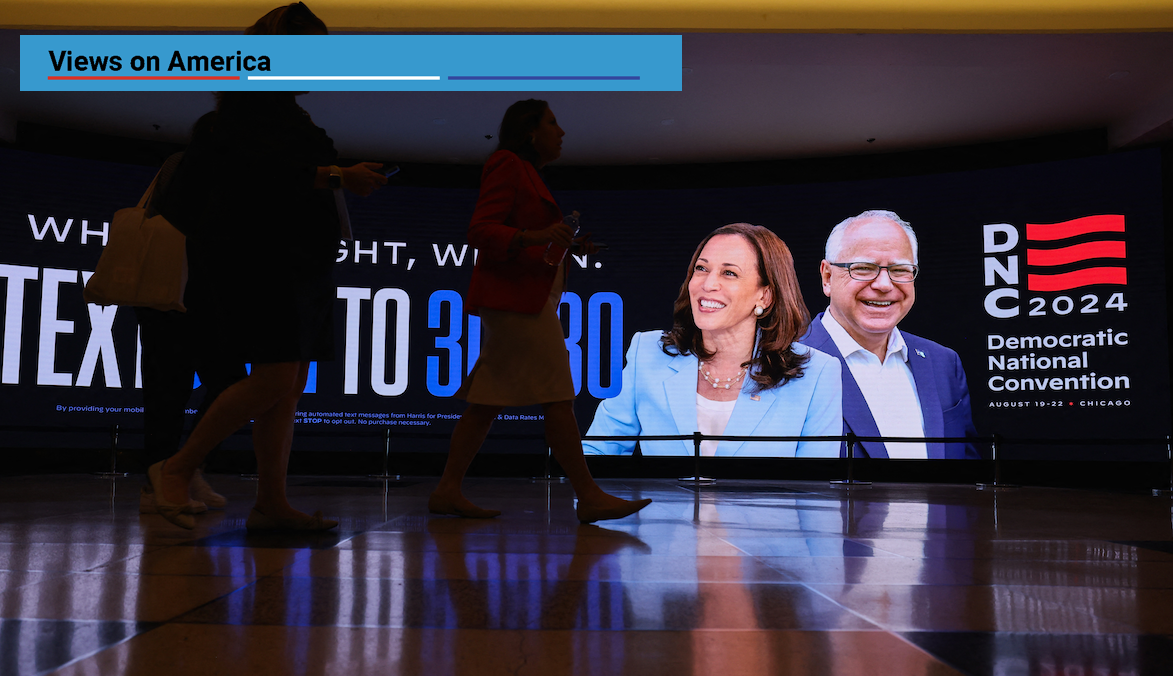In standard practice and just days ahead of the party’s Democratic National Convention, Democrats released their 2024 policy platform over the weekend. The rest of the race, however, has been anything but typical.
In the latest twist, Democrats chose not to update their party platform despite the name atop the ticket switching from Joe Biden to Kamala Harris. Instead, they opted to stick with a version approved in mid-July – from before Biden dropped out of the race. The platform frames a battle between “opportunity and optimism” versus “revenge and retribution,” laying bare a fundamental difference between the 2024 Democratic and Republican campaigns: one is about atmospherics, and the other is deeply personal.
In the month that Harris has sat atop the ticket, she has overseen a near-total change in the campaign narrative. Until July 21, 2024, Biden and former President Donald Trump had spent months locked in a protracted and bleak conversation about who was the bigger threat to democracy. Was age the more significant concern? How would the US manage a president with felony convictions? For months, US voters sat on the sidelines of a slow walk to a repeat of the 2020 election, which a meaningful proportion of those polled did not want.
With Biden’s exit from the race in July and the surprisingly seamless convergence around Harris, the storyline has shifted from a rerun to a “new way forward,” to take one of the vice president’s campaign taglines. And as the 2024 party platform reflects, for Dems, this way forward need not be connected to one politician or another.
Despite the newfound support for Harris – her campaign raised a reported $200 million during her first week as the candidate – this is not yet the Harris Democratic party. Harris is a conduit for Democrats who were searching for a lifeline out of a crisis and a path to preserve their November ambitions. If the policy platform is not updated to any specific Harris policy viewpoint, that’s not seen as a hindrance. If her vision of an “opportunity economy” is questioned by economists, it deserves only a bit of hand-wringing. While a Harris presidency would likely move policy in impactful ways, what is driving the moment for Democrats is unity behind defeating Trump.
This campaign tactic or strategy is paying dividends. Harris now leads Trump in head-to-head polling and across key swing states, including Michigan, Pennsylvania, and Wisconsin. For the first time in the 2024 race, the latest monthly polling shows that more voters trust Harris to handle the economy than Trump. These poll results came in even before Harris had the opportunity to present her economic plan last Friday in North Carolina, where she homed in on tackling price gouging, housing insecurity, and rising tax bills.
In stark contrast, the Republican Party is synonymous with Trump. The party’s policy objectives are intertwined with Trump’s political agenda. The 2024 Republican platform, rife with capitalization and exclamation points, promises to seal the border, end the weaponization of government against the American people, and turn the US into a manufacturing superpower. Each is a key Trump view. As a sign of how far the campaign needle has moved, Trump’s allies are now urging him to return to the more disciplined, issue-based messaging he managed earlier in the 2024 campaign. The risk is that as Democrats go conceptual, Trump becomes too personalized and personal.
All of this will be on display at this week’s DNC in the Windy City, where a who’s who of Democratic heavyweights and orators – including both Obamas and Clintons – have assembled. Harris will take the stage on Thursday, the final night, to deliver an address under the aspirational theme “For our Future.”
Just as the race approaches the post-Labor Day homestretch, the world is watching as Democrats inject something into the campaign that has been missing over the long election slog: energy. The party convention represents a key test of both how well Harris can hold the party together, including around fault-line issues like the Israel-Gaza conflict, and whether Democrats can sustain the good vibes over the final push of the campaign season.
Lindsay Newman is a geopolitical risk expert and columnist for GZERO.
